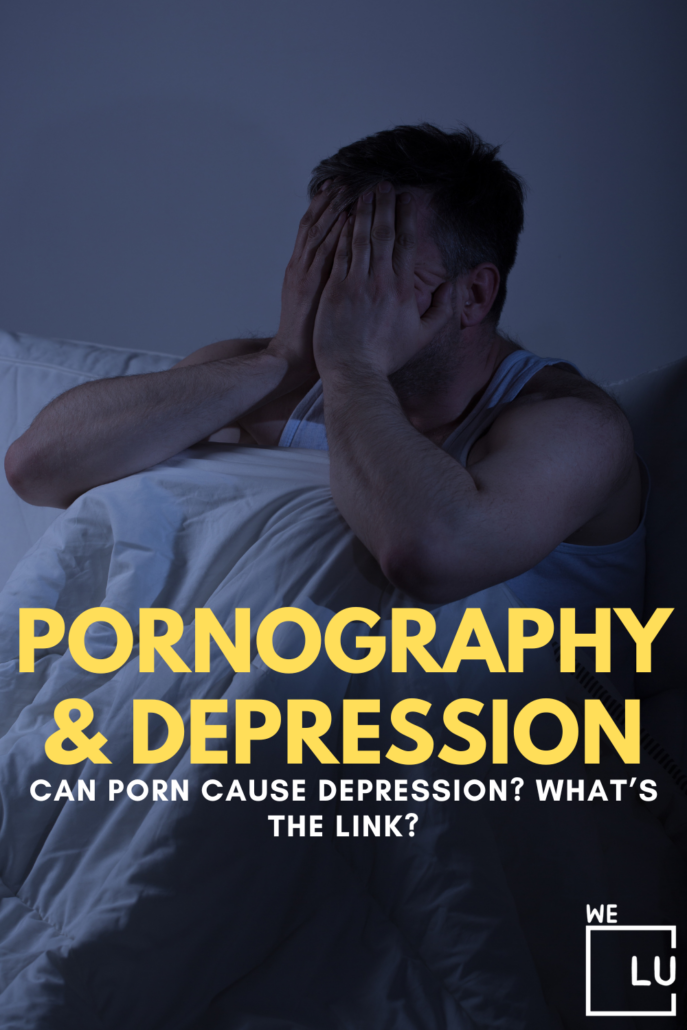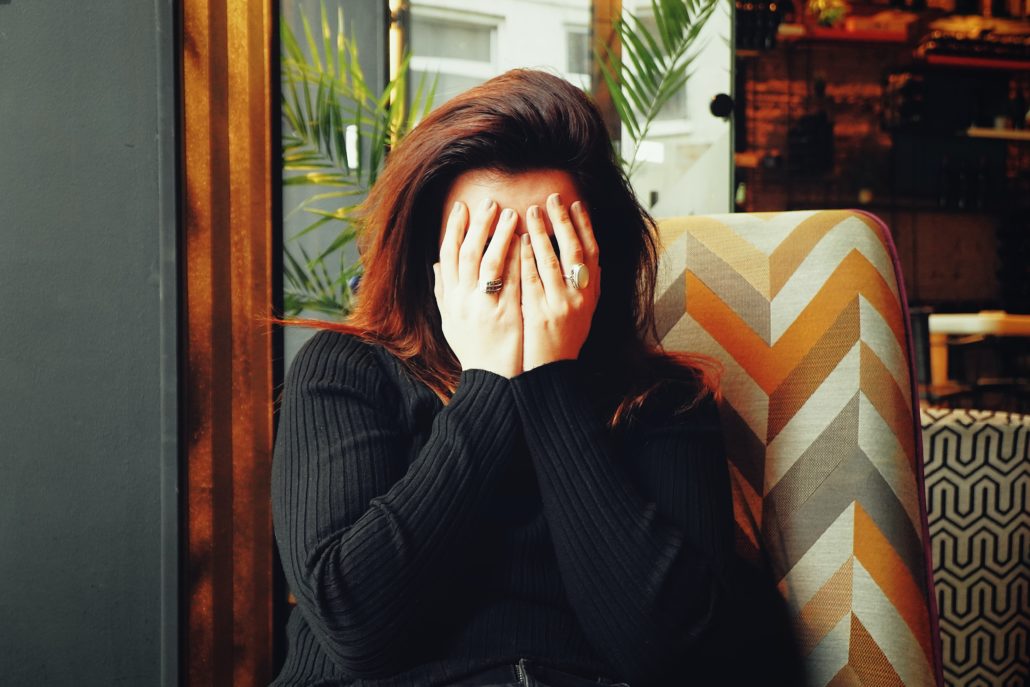Pornography and Depression
Pornography is visual or printed material containing explicit displays of naked body parts conducting erotic actions such as sexual gestures or intercourse. Depression is a common and serious medical illness that negatively affects your mental state and, in most cases, brings your mood to a complete low, making you feel sad and hopeless.
While pornography and depression may not seem related, research suggests the two subjects may share more in common than you think.
A recent study indicates a significant relationship between mental health and pornography use, which included behaviors reflecting behavioral addictions, highlighting the potential contribution of internet pornography to adverse mental health amongst several university students.
Does Porn Cause Depression?
Depression, a mental health condition, significantly impacts an individual’s mood, often leaving them overwhelmed by feelings of sadness, hopelessness, and a lack of motivation. Decreased serotonin levels often accompany this emotional state. Given that serotonin is released during orgasm, a link between pornography and depression emerges. Additionally, some individuals turn to pornography as a means to avoid emotional discomfort, especially if they lack adequate coping mechanisms to manage unwanted feelings.
Pornography addiction isn’t necessarily synonymous with sex addiction, contrary to common perception. Watching pornography and experiencing orgasms can initially provide a sense of relief and distraction from feelings of anxiety and depression. This temporary alleviation contributes to why individuals gravitate toward it. When someone is grappling with depression, they often seek various coping mechanisms to distract themselves from their depressive emotions.
However, excessive pornography consumption can exacerbate depression. Similar to drug addiction, prolonged exposure to pornography can lead to tolerance. This means that individuals who excessively consume pornography may experience reduced pleasure over time, necessitating higher levels of stimulation and dopamine to replicate the initial pleasurable effects. Consequently, this cycle fuels the addictive nature of pornography.
The Role of Dopamine in Porn and Depression
When the brain remains consistently in heightened arousal, it adopts a protective mechanism by reducing its dopamine release. As a neurotransmitter responsible for pleasure, satisfaction, and motivation, decreased dopamine levels can lead to moodiness, fatigue, and diminished motivation. Furthermore, dopamine is critical in sleep patterns, learning abilities, mood stability, motivation, and overall awareness. When dopamine functions inadequately, it can disrupt various bodily functions it influences.
Understanding dopamine’s role in brain function and its interaction with pornography aids in comprehending the link between pornography and depression. Apart from depression, pornography addiction has been associated with distress, anxiety, isolation, loneliness, irritability, anger, and reduced sexual satisfaction.
Individuals tend to withdraw when they experience diminished motivation and pleasure. Moreover, feelings of shame or a desire for privacy during pornography use may lead individuals to self-isolate. Unfortunately, prolonged isolation can trigger feelings of loneliness and distress. Furthermore, anger, irritability, and a decline in sexual satisfaction stem from the impairment of the brain’s reward center due to excessive pornography consumption. With decreased dopamine production, the pleasurable effects typically sought through pornography become elusive.
When is Too Much Porn?
Recognizing signs that indicate excessive porn consumption has negatively affected someone’s life:
- Social Isolation: They prioritize watching porn over socializing or engaging in interpersonal interactions.
- Dissatisfaction with Partner: They become increasingly dissatisfied with their partner’s physical appearance or sexual intimacy.
- Preoccupation with Sexual Thoughts: Constantly preoccupied with sexual thoughts throughout the day, eagerly anticipating new content on preferred porn websites.
- Lack of Emotional Intimacy: They perceive sex solely as a physical act devoid of emotional connection or intimacy.
- Risky Behavior: Engaging in risky behavior by searching for porn at work or in situations where their partner could potentially catch them.
- Objectification of People: They start objectifying individuals more, viewing them primarily in a sexual or objectified manner.
- Escalation in Sexual Activities: They desire to explore different sexual activities or may attempt to replicate pornographic content with others.
Can Depression Lead to Watching Pornography?
While depression itself doesn’t necessarily cause extensive porn consumption, research indicates an association between the two. According to experts, depression often diminishes feelings of sexual desire rather than fueling excessive porn-watching.
A study in 2019 highlighted that depression significantly predicted problematic pornography use in both men and women. Researchers rationalized this link by suggesting that individuals turn to porn as an escape from existing unpleasant emotions they’re experiencing.
Individuals seeking a sense of aliveness amid depression may turn to pornography, finding excitement in sexual stimulation, including masturbation and orgasm. However, moral conflict or relationship issues can trigger feelings of shame or guilt, perpetuating a cycle of worsening emotions.
Moreover, during periods of depression, individuals might withdraw from social activities, leading to loneliness and isolation. Research suggests that this isolation could potentially result in increased porn use as a means to alleviate boredom, self-soothe, compensate for lacking sexual intimacy, or evade confronting underlying issues.
The onset of COVID-19 witnessed a surge in porn viewing, potentially linked to increased levels of depression, anxiety, and social isolation among individuals staying at home, feeling less connected socially.

Skip To:
Learn More:
- Do Crystals For Depression Work?
- Depression and Anxiety Therapist Fort Lauderdale. EMDR Therapy Fort Lauderdale.
- Learn How to Cope with Depression. 10 Ways to Cope with Depression.
- Depression and ADHD: What’s the Link?
- Autism and Depression Connection, Diagnosis & Treatment
- Signs of Depression in Men, Causes, & What to Know
- Rehab for Depression & Anxiety Treatment
- What is the Best SSRI for Anxiety?
- Social Anxiety Disorder
- Grounding Techniques for Anxiety Attacks
- Mental Health Poems that are Powerful and Healing
- Short-Term Disability Mental Health
Get Help. Get Better. Get Your Life Back.
Searching for Accredited Dual Diagnosis Mental Health Centers Near You?
Even if therapy failed previously, or are in the middle of a difficult crisis, we stand ready to support you. Our trusted behavioral health specialists will not give up on you. When you feel ready or just want someone to speak to about counseling alternatives to change your life call us. Even if we cannot assist you, we will lead you to wherever you can get support. There is no obligation. Call our hotline today.
FREE 24/7 Dual Diagnosis Mental Health Services Hotline
Why Do You Feel Guilty After Watching Porn?
Feelings of guilt after watching pornography can stem from various factors, including personal beliefs, moral values, societal norms, or individual circumstances. Here are several reasons why someone might feel guilty after watching porn:
- Moral or Religious Beliefs: For some individuals, religious or moral teachings might consider pornography consumption as inappropriate or morally wrong. Engaging in an activity that contradicts personal or cultural values can lead to feelings of guilt.
- Social Stigma: Societal norms and cultural influences may contribute to the perception that watching pornography is taboo or unacceptable. This social stigma surrounding porn consumption can induce guilt in individuals who feel they are violating societal expectations.
- Personal Standards: Some people set personal standards or ethical boundaries regarding sexual behavior or the consumption of explicit content. If watching porn contradicts these self-imposed standards, it can result in feelings of guilt or shame.
- Relationship Concerns: Watching pornography might evoke guilt in individuals who feel it affects their relationships negatively. Concerns about betraying a partner’s trust, damaging intimacy, or feeling disconnected from a partner due to porn consumption can lead to guilt.
- Perceived Addiction or Loss of Control: If someone feels they are unable to control their consumption of pornography or if it interferes with daily life or responsibilities, they might experience guilt due to perceiving it as an addiction or loss of control.
- Conflicting Emotions: After the initial arousal or pleasure from watching porn subsides, individuals may experience conflicting emotions, such as regret or guilt, especially if they feel it doesn’t align with their values or if they use it as an escape from stress or emotional discomfort.
Overall, feelings of guilt after watching pornography are subjective and can vary significantly from person to person based on their beliefs, values, and personal experiences.

End the Emotional Pain. Get Your Life Back.
Feeling Depressed, Anxious or Struggling with Mental Health Illness? Get Safe Comfortable Mental Health Dual Diagnosis High-Quality Therapy From Counselors That Care. Begin Your Recovery Now.
Hotline (855) 940-6125Getting Help for Porn and Depression
The initial step is acknowledging the issue and seeking appropriate therapeutic assistance.
Assuming control over porn addiction and nurturing self-care can involve utilizing programs that monitor online activities:
To prevent adverse outcomes like excessive porn consumption for emotional relief, recognizing periods of elevated depression or impulsivity is crucial. Employing healthy interventions such as exercise, seeking support from friends, attending counseling, joining support groups, or practicing meditation during these times is beneficial.
Recognizing the potential risks of untreated conditions such as undiagnosed depression or ADHD is essential to avert adverse consequences.
Monitoring daily habits or utilizing tools like the Mental Health Similarity Scores in the Behaviour app facilitates tracking progress in reducing porn addiction and assessing the effectiveness of efforts over time.
What Does Treatment Look Like?
For individuals dealing with severe symptoms of porn addiction, opting for inpatient or residential treatment within a treatment facility could prove beneficial. This choice allows individuals to distance themselves from external pressures and focus entirely on recovery. Typically spanning from 28 to 90 days, these programs offer an immersive approach, and some extended treatment options are also available.
- Individualized treatment: This approach proves valuable for recognizing triggers and learning healthy strategies to manage them. Treatment modalities, such as cognitive behavioral therapy (CBT), are commonly accessible.
- Group therapy: Engaging in group sessions enables individuals to connect with peers facing similar challenges, fostering the development of coping skills essential for navigating the daily struggles of porn addiction. Although these groups are typically easily accessible, individuals with severe depression or social anxiety may find it challenging to join initially.
- Medication combined with therapy: When dealing with an underlying mental health condition like depression or an anxiety disorder, medicine might complement psychotherapy and behavioral interventions as part of the treatment plan.

World-class, Accredited, 5-Star Reviewed, Effective Mental Health Dual Diagnosis Programs. Complete Integrated Inpatient Rehab with Free Post Discharge Therapy Planning.
CALL (855) 940-6125End the Emotional Pain Rollercoaster. Gain Stability & Happiness Through Recovery Treatment. Start Mental Health Counseling Today. Get Free No-obligation Guidance by Behaviroal Health Specialists Who Understand Mental Health Recovery.
We Level Up Dual Diagnosis Treatment
Creating a treatment plan that addresses the physical aspects of withdrawal, the psychological connection with drug use, and managing underlying mental health disorders is part of setting clients up for success. A thorough mental health analysis identifies possibilities for treatment. Meeting with mental health counselors and medical care providers means access to behavioral therapy and medication treatment. At our dual diagnosis treatment center, We Level Up can implement the highest quality of care.
We recognize the fragile complexities of how mental and substance abuse disorders can influence others and sometimes result in a vicious cycle of addiction or in an alcohol depression cycle. That’s why we offer specialized treatment in dual-diagnosis cases to provide the most excellent chance of true healing and long-lasting recovery. There is no set alcohol depression recovery time, each person has their own time.
It can be challenging to accept that you may be living with a mental illness, but once it is properly diagnosed and treated, treating the presenting case of substance abuse can be magnitudes easier. Only a properly trained medical professional can diagnose these underlying conditions. If you believe you are suffering from a disorder alongside addiction, we urge you to seek a qualified treatment center to begin your journey to recovery. Call We Level Up today.
Clinical Depression Symptoms – Get Help
Experience Transformative Recovery at the We Level Up Treatment Center.
See our authentic success stories. Get inspired. Get the help you deserve.



Start a New Life
Begin with a free call to a behavioral health treatment advisor. Learn more about our dual-diagnosis programs. The We Level Up treatment center network delivers recovery programs that vary by each treatment facility. Call to learn more.
- Personalized Care
- Caring Accountable Staff
- Comfortable Amenities
- Licensed & Accredited
- Renowned w/ 5-Star Reviews
We’ll Call You
Search We Level Up FL What’s The Connection Between Pornography And Depression Resources
Sources
- MedicalNewsToday. (2021). What to know about a dopamine detox: https://www.medicalnewstoday.com/articles/dopamine-detox Pornography and Depression, depression porn Related articles
- National Institute of Mental Health. (2021). Depression. https://www.nimh.nih.gov/health/publications/depression Pornography and Depression, depression porn Related articles
- American Psychiatric Association. (2019). What is Psychotherapy? https://www.psychiatry.org/patients-families/psychotherapy Pornography and Depression, depression porn Related articles
- Fasthosts. The World’s Busiest Websites in 2020. Available at: https://www.fasthosts.co.uk/web-hosting/busiest-websites/data. Pornography and Depression, depression porn Related articles
- Perry S. Pornography Use and Depressive Symptoms: Examining the Role of Moral Incongruence. Soc Ment Health. 2017;8(3):195-213. doi:10.1177/2156869317728373. Pornography and Depression, depression porn Related articles
- Borgogna N, Duncan J, McDermott R. Is scrupulosity behind the relationship between problematic pornography viewing and depression, anxiety, and stress? Sex Addict Compulsivity. 2018;25(4):293-318. doi:10.1080/10720162.2019.1567410. Pornography and Depression, depression porn Related articles
- Butler M, Pereyra S, Draper T, Leonhardt N, Skinner K. Pornography Use and Loneliness: A Bidirectional Recursive Model and Pilot Investigation. J Sex Marital Ther. 2017;44(2):127-137. doi:10.1080/0092623x.2017.1321601. Pornography and Depression, depression porn Related articles
- Camilleri C, Perry JT, Sammut S. Compulsive Internet Pornography Use and Mental Health: A Cross-Sectional Study in a Sample of University Students in the United States. Front Psychol. 2021;11:613244. Published 2021 Jan 12. doi:10.3389/fpsyg.2020.613244 Pornography and Depression, depression porn Related articles
- Daspe M, et al. (2018). When pornography use feels out of control: the moderation effect of relationship and sexual satisfaction.
https://pubmed.ncbi.nlm.nih.gov/29281588/ Pornography and Depression, depression porn Related articles - Depression [Fact sheet]. (2018).
https://www.nimh.nih.gov/health/topics/depression/ depressed porn, Pornography and Depression, depression porn Related articles





